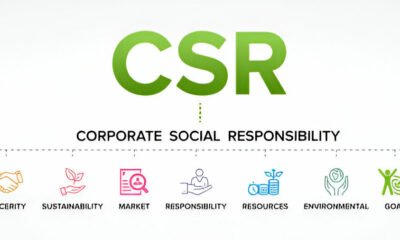

Features
Why Impact Investing is Great for Both the Planet and Company Profits
N’Gunu Tiny, Founder and Executive Chairman of the Emerald Group, on impact investing and why it’s coming into its own in 2021
There are a number of new practices that are good for protecting the planet. Impact investing is a concept that is good for the environment and can be good for the planet too.
Impact investing is shifting towards the mainstream. This isn’t a minute too soon, as our world needs every sector to work together to create a sustainable future. The challenges facing humanity are immense. From climate change to social inequality, and from food security to the threat of more pandemics, there is long fight ahead.
Investors are waking up to this now urgent need to ensure their money goes towards something that benefits humanity. Traditionally, of course, investing has been about making a profit. And it still is. The difference now is that impact investing does not preclude making hefty returns.
Why impact investing is now the primary concern for investors
Over the past 20 years, and particularly during the last five years, there has been a fundamental paradigm shift in investment strategy and thought. This groundbreaking change in attitude and thought process is now becoming truly mainstream.
While the shift in thought is relatively simple to explain, its long-term ramifications are far more complex. Not too long ago, the idea of making a profit and doing something ‘good’ were mutually exclusive. Investors simply didn’t believe that a profit could be made through investing in social and community related opportunities. This has led to the inception of a number of ethical investing strategies.
In general, investors have tended to consider doing good the domain of philanthropists, Government programs or not-for-profit organizations. They did not see it as connected with investment and making money. Thankfully, in 2021 this is no longer true.
Right now, increasing numbers of small and large investment funds are operating with both ideas working together. It’s become the norm for impact investment to make a difference and make a profit. This proves to investors everywhere that it’s absolutely possible to create social impact and make decent returns. They no longer have to choose between the two.
Breaking down impact investment terminology
It’s worth just running through some of the key terminology involved in impact investment. The term itself now means the creation of measurable social impact and making positive returns. The following terms are used within investment and finance all around the world.
- ESG/Environmental and Social Governance
This covers these major factors in the ongoing measurement of societal impact and sustainability of an investment decision: environment, social and corporate governance.
A framework for businesses to follow to show their social credentials to stakeholders by continuously monitoring their environmental, social and economic impacts.
- SDG/Sustainable Development Goals
The United Nations General Assembly set the SDGs in 2015. There are 17 SDG that are designed to be a guide towards achieving a more sustainable future for everyone around the world. The deadline to meet them is 2030.
These terms were once used more or less interchangeably within investment circles. For example, ESG became a kind of popular ‘buzzword’ to describe how companies are trying to meet the SDGs. When the UN implemented the goals in 2015, impact investment was still very much a niche investment strategy. However, the goals also pushed a shift in thinking within investment circles, something that has grown in the years since.
Now in 2021, there is an acceptance of financial services being linked with sustainability and positively impacting the world around them. According to data from PwC, by 2025 around 60% of mutual fund assets will come under the ESG banner.
Large investors are leading by example
There are high profile examples of large global investors making changes in this area that are making huge returns. For example, one of the world’s biggest investors BlackRock launched its own mission to hold companies accountable in 2020. Most businesses were focused only on the immediate problems and challenges presented by the pandemic, but BlackRock has its eyes firmly on the long-term. Its company priorities laid out in 2020 included the requirement that company directors prove their ESG practices and CSR reporting.
Advisory firms and investment funds are now ranking companies in CSR and ESG matters. So, they’re working out which companies demonstrate the social and environmental impact of their services and products. They’re also considering the human capital, business ethics and data privacy of the business. The analysis includes looking for any kind of involvement with industries that are considered tainted, such as tobacco, weapons, coal, oil, pesticides and alcohol.
This shows how much the attitude from big investors has changed. They’re not only seeking out investments for themselves that make a positive impact, but they are also monitoring companies on their societal impact. These two strategies are ensuring that money going into socially responsible investment funds is now breaking records. Now that the large pension, mutual and institutional funds are fully adopting and running with ESG strategies, the change is flowing down to company level.
What entrepreneurs and start-up owners need to know about impact investing?
Most start-up founders and entrepreneurs, particularly in tech sector, already know how vital the societal impact of their business is. Those that are only just realizing the urgent need to incorporate ESG considerations, should begin by reviewing their strategic goals.
Taking the time to fully understand the SDGs and aligning all business strategies along these lines is a good first step. This clear alignment with and understanding of SDGs will stand new companies in good stead to attract investment. It will also help to attract customers and new users – a win/win strategy for the third decade of the 21s century.
Investment sector trends include enormous potential of making enormous societal impact. These popular sectors include fintech, edtech, agritech and logistics/supply chain. However, there are other sectors that are up and coming in their impact and attraction to impact investors, including energy, manufacturing and transportation.
These sectors will continue to expand and evolve over the next few years, bringing with them yet more focus on sustainable strategies. Companies that can fully demonstrate their commitment to a positive impact on the wider society will be more in demand for investors.
Entrepreneurs should consider the following when managing the impact credentials of their company. This is what investors are looking for, and business leaders and founders should bear in mind:
- The positive impact of your business must be real.
- The contribution towards the social environment must be meaningful.
- You must be able to demonstrate measurable and proven results.
The third on this list is the most important to impact investors today. They want to know exactly how the company impacts the world around it, and how much good it does. For a few years it was possible for organizations to pay lip service to the SDGs without having to prove anything. Today, investors are on the lookout for greenwashing and are serious about the kinds of investments they get involved with.


 Environment12 months ago
Environment12 months agoAre Polymer Banknotes: an Eco-Friendly Trend or a Groundswell?

 Features11 months ago
Features11 months agoEco-Friendly Cryptocurrencies: Sustainable Investment Choices

 Features12 months ago
Features12 months agoEco-Friendly Crypto Traders Must Find the Right Exchange

 Energy11 months ago
Energy11 months agoThe Growing Role of Solar Panels in Ireland’s Energy Future




























